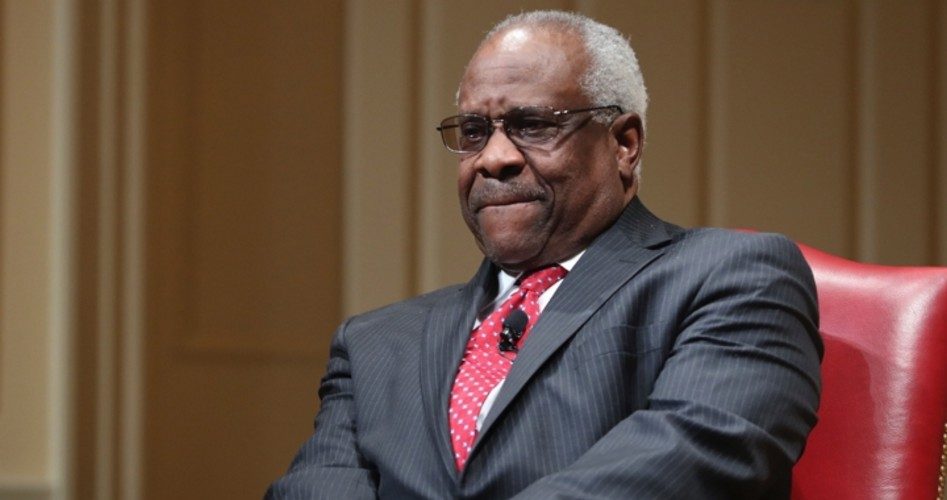
Supreme Court Justice Clarence Thomas may have confirmed the worst fears of pro-abortion advocates by decrying “erroneous precedent” on Monday. And while his statement was part of an opinion on a gun-rights case, some experts believe that Justice Thomas has tipped his hand on his stance on Roe v. Wade.
“When faced with a demonstrably erroneous precedent, my rule is simple: We should not follow it,” Thomas wrote in his decision Monday in Gamble v. United States, adding that the court should not “elevate” precedent over the U.S. Constitution.
In his opinion, Justice Thomas took issue with “stare decisis,” the legal principle that courts should not overturn precedents without good cause. Thomas rebuts this principle, asserting that precedent should not replace the court’s jurisprudence to exercise judgment and focus on “correct, original meaning” of the laws being interpreted.
“My view of stare decisis requires adherence to decisions made by the People — that is, to the original understanding of the relevant legal text — which may not align with decisions made by the Court,” Thomas wrote.
“In our constitutional structure, our role of upholding the law’s original meaning is reason enough to correct course,” he added.
Thomas’ opposition to “stare decisis” is nothing new. The late Justice Antonin Scalia once told Thomas biographer Ken Foskett that Thomas “doesn’t believe in stare decisis, period,” according to Reuters. Scalia told Foskett, “If a constitutional line of authority is wrong, he would say ‘let’s get it right.’”
Likewise, Reuters observes that Thomas had already “demonstrated his willingness to abandon precedent in February when he wrote that the court should reconsider its landmark 1964 New York Times v. Sullivan ruling that made it harder for public officials to win libel lawsuits.”
Thomas’ stance on “erroneous precedent” could have major ramifications for abortion, particularly since abortion advocates are already fearful that an increasingly conservative Supreme Court may overturn Roe v. Wade. Several states have taken radical measures to protect women’s access to abortions and others are working to enshrine the “right” to abortion in their constitutions in fear that Roe v. Wade will be overturned.
“Thomas says legal questions have objectively correct answers, and judges should find them regardless of whether their colleagues or predecessors found different answers,” said Jonathan Entin, a law professor at Case Western Reserve University in Cleveland. “Everyone is concerned about this because they’re thinking about Roe v. Wade.”
Pro-abortion advocates hang their hats on the precedent set by Roe v. Wade, and continually draw upon the notorious abortion ruling, to defend the “right” to abortion.
“The [new pro-life] laws that have been adopted in several states violate the Court’s settled precdent in Roe,” Kristen Clarke, president and executive director of the Lawyers’ Committee for Civil Rights Under Law, told Fox News.
However, it is clear from Monday’s opinion that Justice Thomas does not believe in “settled precedent” and that said precedent trumps constitutionality.
“The Constitution tasks the political branches — not the Judiciary — with systematically developing the laws that govern our society,” Thomas wrote. “The Court’s role, by contrast, is to exercise the ‘Judicial Power,’ faithfully interpreting the Constitution and the laws enacted by those branches.” For Thomas, if fulfilling the role of the federal court means overturning long-held precedents, it must be done.
Thomas contends that the Court’s dogged adherence to precedent leaves little room for constitutionality, and cited the 1992 Planned Parenthood v. Casey as a troublesome example.
Given that Casey upheld Roe v. Wade and prohibited states from placing “undue burden” on women’s access to abortion, this reference is likely to draw fear from the pro-abortion crowd.
Citing his own dissenting opinion in the Casey case, Thomas writes, “The standard set forth in the Casey polarity has no historical or doctrinal pedigree and is the product of its authors’ own philosophical views about abortion with no origins in or relationship to the Constitution.”
While the Supreme Court recently refused to hear an Indiana case involving a law that protects the unborn from discriminatory abortions on the basis of race, sex, or disability, experts believe that it is only a matter of time before the court will hear another abortion case, a suspicion that Justice Thomas recently confirmed. Thomas wrote, in the May 28 decision to refuse the case, that he believes the high court needs to engage in “further percolation” on the issue before hearing a major case that could overturn Roe v. Wade.
But even in his concurrent opinion on declining to take up the case, Thomas addressed his concern that abortion was becoming a “tool for eugenic manipulation” and declared that the Court will soon have no choice but to “confront the constitutionality of laws like Indiana’s.”
Photo: AP Images




